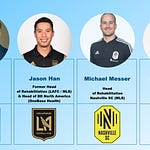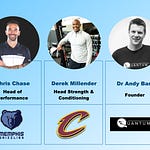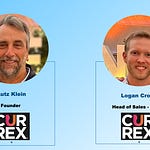This week we had the honor to interview David Rose and Emma Barraclough, top executives of Chelsea Digital Ventures. David is the head of Chelsea Digital Ventures, and Emma is a Product owner for Blue Fuel, an elite sports nutrition company, developed with Chelsea FC.
📝 Show Notes: Through this interview, we touched on Chelsea Digital Ventures’ latest initiatives (Blue Fuel and C-score), what they've learned so far from launching those products. Then we discussed their overall strategy, what it was like for Chelsea FC to win the Champions League this year, and what their plans are for the next 24 months.
🚀 Best Quotes: Here’s some of the key discussion points and best quotes from our conversation with David and Emma:
On their respective roles at Chelsea Digital Ventures:
David Rose: “ I head up Chelsea Digital Ventures. What that is, is a spin-out from Chelsea Football Club and we believe quite a unique way to take on innovation in the sports tech space. Where we started is to look at the expertise that exists within the football club, where we're lucky enough to have some leading experts in fields such as nutrition, fitness, player monitoring, health, football and technique, and build our products and services that utilize that expertise. But build those products and services out, aimed at an audience that isn't just limited to fans of Chelsea or fans of football, but anyone who could benefit from services that have that degree of expertise at their core”.
Emma Barraclough: “As Product Owner of Blue Fuel, I head up the development of Blue Fuel. And as David mentioned, we've taken some of the nutritional expertise as one of the areas to look at within the club and we basically went about looking at how we could try and take some of that expertise and make it useful for some more everyday sports participants. So you might have some very keen amateurs who were trying to train like the pros, certainly buy the football kit like the pros and the boots, and everything to go with it, but how could they try and sort of address some of their nutrition like that? Because there's a huge proliferation of products on the market, but it's really the expertise part that people still miss out. So you can buy and shop for a whole range of different protein, energy drinks, energy gels, hydration powders, those sorts of things, but it's really that knowledge of how to best use those products around matches and training and to try and get the best out of them and then help the body recover, et cetera, afterwards”.
On what Blue Fuel is:
Emma B: “The kind of food-first approach that the players take in terms of how do you then try and manipulate the diet around what the demands of those players are. So the days before matches, you're really looking at trying to increase energy intake. In days where there's a bit less activity, it's probably dropping that overall energy intake, but you might be looking to increase protein for instance, to try and help out a sort of rebuild phase and I'd say, trying to bring that kind of knowledge and best practice into something that an everyday user can use. So we developed an app that you can have on your phone that basically operates in the way that a nutritionist would do. It would look at what's your schedule, what you have inputted, what the demands of that is, and then it would make recommendations of meals. So we've got a whole sort of recipe suite designed around that. And we’ve developed a range of physical products to support the app (..) There are ten physical products. The app is actually free to use, so you can go on and have a little play around it and access some of those recipes in the recommendations”.
David R: “I think one of the interesting things with Blue Fuel is the authenticity. It is a word that we use a lot within Chelsea Digital Ventures. This is not about our brand exercise where we're building products and applying the Chelsea mark and using that mark and the support of the football club. It's about genuinely utilizing that knowledge. So in Blue Fuel, probably the greatest proof point of that is, in developing those 10 SKUs, is that they were developed with our nutritionists, and with feedback from our players. They are used across our men's and women's team, and where appropriate across our academy. So this is not something that we have bashed and are out just selling to keen amateurs. In fact, in many ways we are a significant supplier of nutrition to ourselves. And ultimately, you can imagine when you're playing at the level that a team like Chelsea FC plays at, there can be no compromise. So at no point have I said to Emma, "Well listen Emma, wouldn't it be great if we could change the formulation slightly, reduce the cost of goods, or compromise on quality slightly because our margin would be better". It actually has always been, "Yeah, let's make the very best product to the requirements that have been set to us by the football club and then, let's find a way to effectively share that knowledge with amateurs and share that product with amateurs".
On the response from the fans and how they came up with the idea:
David R: “It's a strange one because one of the greatest challenges for us is to come back to that point that we're building services here that aren't solely aimed at the Chelsea fans. So actually one of the biggest measures is: Are we getting our product messaging across to the people who have that need? There will be of course a crossover between active participative Chelsea fans who may play rugby, hockey, or soccer. And we have to explain to them that, which given our reach and given the great sort of channels and conversations that we can have with our fans is slightly easier, but in many ways the initial challenge is to make a nutrition range that's been developed and associated with football, and is relevant within other sports, and we hope, to fans of other clubs as well. If you have a good product, then it's a good product regardless of where it's being developed“.
On how they came up with the idea:
David R: “So the idea now stretches back to three years ago, whereby once I think we've looked at different ways that we could approach innovation. There are many organizations and businesses looking at an incubation model, or a pure investment, and there are some great work that is being done by third parties. I think we felt that within sports there needed to be something else, and a slightly different approach or at least a different approach that was worth exploring. We started then by looking at what we had, and of course we have an audience, but more importantly, we had the feeling that if you stop looking at Chelsea through the eyes of just being an elite football team and instead if you start looking at it as being an elite sports organization, it would be better, And what made it a leap was the knowledge that we had contained within. We listed out all those various elements, and including in that was the digital expertise that we had through the work we had done with the club, as well as the expertise within our marketing commercial divisions. So we brought that together and it was a melting pot for ideas. We probably explored nearly 30 different ideas based on mapping out all of those pockets of expertise within the club. We did a nine month concept phase where we worked out those ideas. Like any good funnel, you throw some away as you go and you throw many away pretty much immediately”.
On what C-score, its other product, is:
David R: “C-score is in a very different space. So as a football club, our business in many ways is to ensure the health and fitness of our players. There's a direct correlation between keeping your players fit and healthy throughout the season and the club's performance. And I think we've got a responsibility as well out to our staff, and I would extend that to our fans to promote good health. We also have a program whereby, we have our academy, we have our loan player program where we're used to ensure that all of those young men and women remain as healthy as possible, and often we're doing that remotely. So that got us thinking just about the sort of population health and what measures there are. And if you take something like BMI, which is a population health tool, it's beautifully simple. Knowing your height and weights is fine but actually for many people its use is misappropriated because it's not a fantastic good measure of your individual health risk. So instead you could be using a mobile phone and take the simplicity of a solution like BMI but strive for something that's far more accurate, without needing to do VO2 max tests or require someone to go to their GP for an appointment. So that's C-score. It's a mobile app. It leads you within about five minutes through a series of seven modifiable lifestyle areas. Where possible, we take measurements using the technical capability of the phone. For instance, we do body analysis from a single image. We use the camera to measure your heart rate. From that we give you a score between zero and 100, which is a measure of your general health”.
On what the objective is with C-score:
David R: “The objective of that is, first off, to educate users and give them an insight as to what may be detrimental areas to their health, and then direct them to partners and services that could be of genuine benefit. So I think our ambition with C-score is huge. We want to be a globally recognized measure of health and promote good health for everyone (..) What's presented to the user needs to be incredibly simple. The science behind the formulation of that score is simple. So C-score became a validated biomarker earlier this year. We've worked with the UK Biobank, which is a database of over 500,000 health records spanning the last 13 years, and they analyzed that database to optimize the algorithm for C-score. So there are three years of science behind what appears to be a very simple app”.
On what they have learned so far after launching those products:
Emma B: “I think initially for us, we were trying to do a kind of completely integrated solution so a user could come in, tell us what their week looked like and we could make a product recommendation that was basically like a monthly subscription, and I think that was quite a tough model in a sector in sports nutrition that isn't particularly developed in the subscription space as much as it exists in sort of food and recipe boxes and that kind of thing. That was probably quite a big learning lesson for us. That's sort of somewhere on that path that we were looking at trying to make things super simple for consumers, but actually they still do need some options in shopping and frequency and all those things. So that was probably one of our biggest steps and problems in terms of the sort of model we had to use”.
David R: “I’d say it's like tongue in cheek that the challenge of launching a sports nutrition service at a unique point in time where amateur sports is effectively outlawed through the pandemic. That has certainly created an interesting challenge over the last 18 months. But the good news is that it shows sometimes in business the importance of patience. It is going to return to normal. The UK amateur sport market really came back with passion this April. We've seen sales, interest levels, and feedback from Blue Fuel increase accordingly and even now we have a really, really strong growth. But the most important thing here is that people are back playing sports again, which is wonderful”.
On what Chelsea Digital Ventures is:
David R: “Sure. So as we were conceiving this strategy we looked into that expertise. That work was born out within the club and that's what gives us this unique access to that talent and those individuals. As we arrived at the businesses that we were going to take forward, we took the decision to spin Chelsea Digital Ventures out of the football club into its own organization. Principally, we're a startup and for each of those businesses we have to treat them with agility and a lean approach to take them in different directions in order to be as agile as possible. And for that you want a startup environment. So while we remain at Stamford Bridge, we have our own dedicated office space. We have a digital structure in terms of our way of working that would be familiar to any of the entrepreneurs listening to this podcast. We retained really close links to the club. We retained access to all of that expertise, and then we have a commercial relationship in place with the football club where it comes to the promotion of those products and services, as any other partner would do”.
On how those two products fit into Chelsea Football Club’s overall strategy:
David R: “In terms of how that relates to the overall strategy, ultimately we want to create successful businesses. I think any business is measured by their revenue and profitability and we're no different. That's our ultimate goal which is to create and enter the nutrition space. We want market share in the sort of nutrition range and we want to be synonymous with that quality and we want to have that sort of distinction of being this educator for sports where we have access to good sports nutritionists. And we think that best practices within the world of sports nutrition have been lacking. The secondary benefit of course is the Chelsea name and brand out to potentially new audiences, which both are here in the UK and globally”.
On what it was like to win a championship last year:
David R: “I think for me it's strange because in business we have our annual targets. We meet those. We're happy or sad depending on our performance. It's just magnified when you work alongside professional sports and you all play your tiny, tiny parts in the success of that club. And therefore, across Chelsea and across Chelsea Digital Ventures, winning the Champions League is a real pinnacle. So to be around many hundreds of people that have played those small parts in doing that, is the ultimate measure of success in what we do, even though you can't directly point to something that you've done to help contribute to it. The feeling of satisfaction within the club and the days after was palpable. It was fantastic”.
Emma B: “It was fantastic also for the year that everybody had as well. I think for the fans, you're looking for that sort of positivity and something to really get excited about around everything else. It's a massive, massive bonus and the life-saving managerial changes. And I guess having been on the side of staff that then work around teams and things in previous lives as a nutritionist, you kind of like that you turned up and you do your job and you have that professional part anyway, but then when the team brings a success with it, then it's nice to think that yeah, as Dave said, you've sort of played your tiny part in kind of fueling to get them there or whatever”.
On the fact that Chelsea FC created a spin off like Chelsea Digital Ventures which is quite unique in the world of elite sports:
David R: “I'm always hesitant to say that it's unique. I'd never want to be the arrogant one because of course there are many people out there with many, many different business models that work and are doing some fantastic work, both across sports and sports tech. I also think our approach is quite different. Certainly there are many people investing or fostering some sorts of third party relationships and doing some great innovation, but it's a pure inside-out approach. I haven't seen anyone else doing what we are doing though”.
Emma B: “It's almost like an academic level when you're sort of looking at pushing boundaries and looking at individual research projects, but we’ve seen very, very few of them that actually come through into actual innovation and the delivery of products to market. As we mentioned, it either exists in the pure third party relationship base or it is kind of at that theoretical level, but it is not actually practically on the ground, and happening within the football club and out in the market at the same time”.
On the work that other clubs like the 49ers in the NFL, or the Warriors in the NBA have done over the year:
David Rose: “These are organizations that we know really well and I have a huge respect for what they're doing but their structure is a little bit different”.
On their plans for the next 24 months?
David Rose: “I think it's to follow-on from that last part of the conversation. It is a new way to approach this challenge. So the ultimate measure is that I would love to prove that there is a model whereby we can build upon this intellectual property and these services that we've created and demonstrate that in a number of them. Because in no portfolio will we ever be arrogant enough to think these businesses could all be successful and that we show that it's possible to incubate and build businesses in this way. And that means, given that if we stay with Blue Fuel we are a market entrant in a very competitive market. We've got to take enough market share, build the brand and its association to quality, to a point that we feel that we can move internationally beyond the UK and we can be a genuinely well-thought supplier to the amateur athlete, as well as the professional clubs. I don't think we mentioned this but Blue Fuel is a bit of a secret product whereby we're already supplying some leading organizations across various sports because the product is good. It's a very bland answer to say, "The strategy is to sweat these businesses until they're either successful or not". And luckily with both C-score and Blue Fuel, we're off to a good start”.













🔥Upside Chat: David Rose & Emma Barraclough, Top Execs at Chelsea Digital Ventures